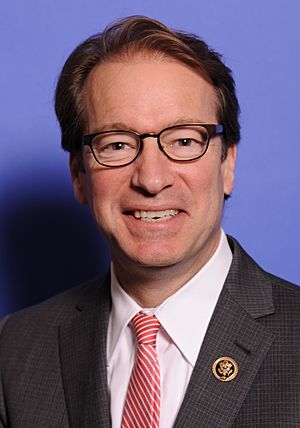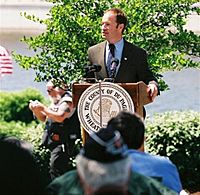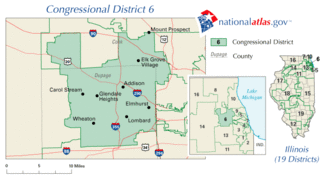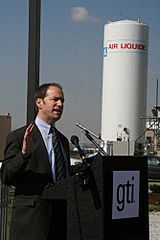Peter Roskam facts for kids
Quick facts for kids
Peter Roskam
|
|
|---|---|
 |
|
| Member of the U.S. House of Representatives from Illinois's 6th district |
|
| In office January 3, 2007 – January 3, 2019 |
|
| Preceded by | Henry Hyde |
| Succeeded by | Sean Casten |
| House Republican Chief Deputy Whip | |
| In office January 3, 2011 – August 1, 2014 |
|
| Preceded by | Kevin McCarthy |
| Succeeded by | Patrick McHenry |
| Member of the Illinois Senate from the 48th district |
|
| In office January 15, 2000 – January 3, 2007 |
|
| Preceded by | Beverly Fawell |
| Succeeded by | Randy Hultgren |
| Member of the Illinois House of Representatives from the 40th district |
|
| In office January 13, 1993 – January 12, 1999 |
|
| Preceded by | Daniel Cronin |
| Succeeded by | Randy Hultgren |
| Personal details | |
| Born |
Peter James Roskam
September 13, 1961 Hinsdale, Illinois, U.S. |
| Political party | Republican |
| Spouse |
Elizabeth Roskam
(m. 1989) |
| Children | 4 |
| Education | University of Illinois, Urbana-Champaign (BA) Illinois Institute of Technology (JD) |
Peter James Roskam (born September 13, 1961) is an American politician and lobbyist. He was a U.S. representative for the 6th district of Illinois for six terms, from 2007 to 2019. A member of the Republican Party, he was the chief deputy majority whip from 2011 to 2014. This was one of the top leadership jobs for his party in the House.
Before serving in Congress, Roskam was a member of the Illinois Senate and the Illinois House of Representatives. In 2018, he lost his re-election to Democrat Sean Casten. After leaving Congress, Roskam began working as a lobbyist, a person who helps businesses and groups talk to the government. In January 2025, he was elected chairman of the board for the National Endowment for Democracy.
Contents
Early Life and Education
Peter Roskam was born in Hinsdale, Illinois, and grew up in Glen Ellyn, Illinois. He was the fourth of five children. After graduating from high school, he went to the University of Illinois at Urbana-Champaign where he studied political science. He later earned a law degree from the Chicago-Kent College of Law.
In 1984, Roskam taught history and government at a high school in the U.S. Virgin Islands. He then worked as an assistant for two congressmen, Tom DeLay and Henry Hyde. In the late 1980s, he was the executive director of a scholarship program for children that his father had started.
Roskam and his wife, Elizabeth, have four children and live in Wheaton, Illinois.
After his parents visited Vietnam, they saw American soldiers' dog tags being sold on the street. His family then worked to find the soldiers or their families to return the dog tags.
Career in Illinois Government
Roskam served in the Illinois state government for many years. He was a representative from 1993 to 1998 and a state senator from 2000 to 2006. In the Senate, he was the Republican whip, which is a leadership role.
As a state senator, Roskam worked on several laws. He sponsored a bill that gave the Supreme Court of Illinois the power to change a death penalty sentence. He also supported stronger punishments for people who repeatedly drive under the influence (D.U.I.). He was the main sponsor of a law that helped courts make sure parents paid their child support.
U.S. House of Representatives
Roskam was elected to the U.S. House of Representatives in 2006. He replaced Henry Hyde, who retired after 32 years in Congress. Roskam won a close race against Democrat Tammy Duckworth, with 51% of the vote.
He won his re-election campaigns in 2008, 2010, 2012, 2014, and 2016. In 2018, the district had become more competitive. Roskam lost to Democrat Sean Casten, who received 53.6% of the vote.
Work in Congress

From 2011 to 2014, Roskam was the chief deputy whip for the House Republicans. This made him the fourth-ranking leader in his party. His job was to help make sure party members voted together on important issues.
During his first term, he and Democrat Gabby Giffords were often interviewed together on NPR's All Things Considered. They talked about their experiences as new members of Congress.
Committee Work
Roskam served on important committees, including:
- Committee on Ways and Means (This committee works on taxes and other money-related issues.)
- Subcommittee on Tax Policy (He was the Chairman.)
- Subcommittee on Health
- Select Committee on the Events Surrounding the 2012 Terrorist Attack in Benghazi
Political Views
Roskam usually voted with the Republican Party. According to the website FiveThirtyEight, he was a strong supporter of President Trump's positions compared to how his district voted.
Environment
In 2006, Roskam called some climate science "junk science." In 2018, he joined the House Climate Solutions Caucus, a group of Republicans and Democrats working on climate change. He said it was important to find "common sense solutions" to challenges from a changing climate. Later that year, he voted against a tax on carbon emissions.
Health Care
Roskam voted against expanding the State Children's Health Insurance Program in 2007. He also voted against a law that would have allowed the government to negotiate for lower prescription drug prices for Medicare patients.
He was in favor of repealing the Patient Protection and Affordable Care Act (also known as Obamacare). In 2017, he voted for the American Health Care Act, which was a plan to replace it.
Economic Issues
Roskam supported making the 2001 and 2003 tax cuts permanent. He also supported tax credits for research and development. In 2017, he voted for the Tax Cuts and Jobs Act of 2017. He said the law would help the middle class.
He also signed a pledge promising to vote against any laws about global warming that would raise taxes.
Foreign Policy
Roskam was a strong supporter of Israel. He worked to oppose the BDS movement, which he said was an effort to harm Israel. He also supported funding for Israel's defense systems, like the Iron Dome.
He was a strong opponent of the 2015 nuclear agreement with Iran. He believed it was important to fight the agreement in every way possible. He also opposed selling airplanes to Iran.
Roskam was against President Barack Obama's plan to move prisoners from the Guantanamo Bay detention camp to a prison in Thomson, Illinois.
After Congress
In July 2019, Roskam joined the law firm Sidley Austin as a partner. He works as a lobbyist and consultant. He said he wanted to use his knowledge and relationships to help others as an advocate.
In January 2023, he became the head of federal policy for the lobbying group at the law firm BakerHostetler in Washington, DC.
Electoral history
| Party | Candidate | Votes | % | |
|---|---|---|---|---|
| Republican | Peter Roskam (incumbent) | 147,906 | 57.57 | |
| Democratic | Jill Morgenthaler | 109,007 | 42.43 | |
| Total votes | 256,913 | 100.00 | ||
| Republican hold | ||||
| Party | Candidate | Votes | % | |
|---|---|---|---|---|
| Republican | Peter Roskam (incumbent) | 114,456 | 63.65 | |
| Democratic | Ben Lowe | 65,379 | 36.35 | |
| Total votes | 179,835 | 100.00 | ||
| Party | Candidate | Votes | % | |
|---|---|---|---|---|
| Republican | Peter Roskam (incumbent) | 76,146 | 100.0 | |
| Total votes | 76,146 | 100.0 | ||
| Party | Candidate | Votes | % | |
|---|---|---|---|---|
| Republican | Peter Roskam (incumbent) | 193,138 | 59.2 | |
| Democratic | Leslie Coolidge | 132,991 | 40.8 | |
| Total votes | 326,129 | 100.0 | ||
| Republican hold | ||||
| Party | Candidate | Votes | % | |
|---|---|---|---|---|
| Republican | Peter Roskam (incumbent) | 65,332 | 100.0 | |
| Party | Candidate | Votes | % | |
|---|---|---|---|---|
| Republican | Peter Roskam (incumbent) | 160,287 | 67.1 | |
| Democratic | Michael Mason | 78,465 | 32.9 | |
| Total votes | 238,752 | 100.0 | ||
| Republican hold | ||||
| Party | Candidate | Votes | % | |
|---|---|---|---|---|
| Republican | Peter Roskam (incumbent) | 83,344 | 68.8 | |
| Republican | Jay Kinzler | 37,834 | 31.2 | |
| Total votes | 121,178 | 100.0 | ||
| Party | Candidate | Votes | % | |
|---|---|---|---|---|
| Republican | Peter Roskam (incumbent) | 208,555 | 59.2 | |
| Democratic | Amanda Howland | 143,591 | 40.8 | |
| Total votes | 352,146 | 100.0 | ||
| Republican hold | ||||
| Party | Candidate | Votes | % | |
|---|---|---|---|---|
| Republican | Peter Roskam (incumbent) | 56,544 | 100 | |
| Total votes | 56,544 | 100 | ||
| Party | Candidate | Votes | % | |
|---|---|---|---|---|
| Democratic | Sean Casten | 169,001 | 53.6 | |
| Republican | Peter Roskam (incumbent) | 146,445 | 46.4 | |
| Total votes | 315,446 | 100.0 | ||
| Democratic gain from Republican | ||||
 | Frances Mary Albrier |
 | Whitney Young |
 | Muhammad Ali |



